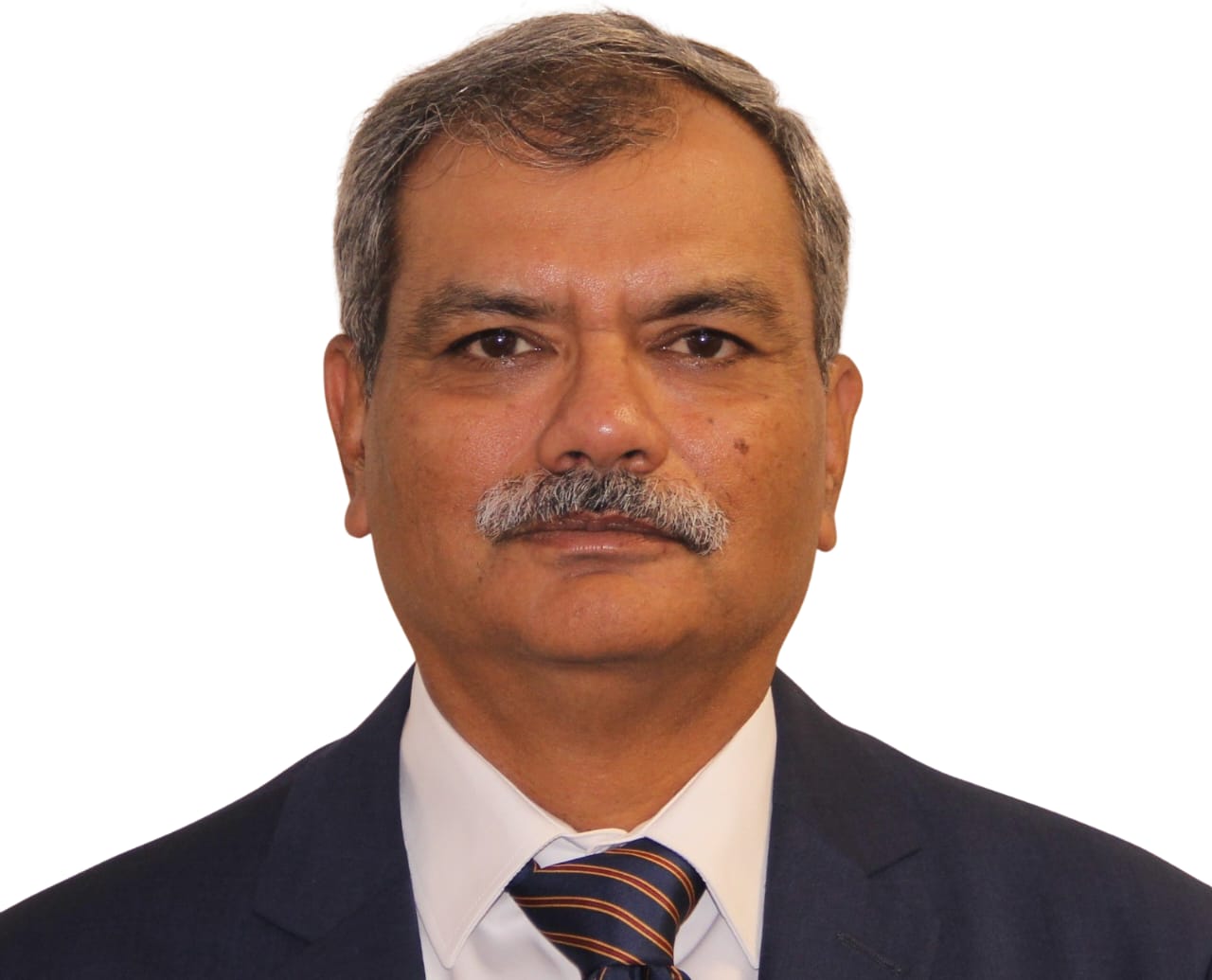
IPS, Himachal Pradesh: 1993
Ministry of Home Affairs
Government Of India
Dear Friends,
Welcome to the official website of the Narcotics Control Bureau (NCB), India. As the nation's premier agency in the fight against drug trafficking and abuse, the NCB is committed to safeguarding the health and security of our society by eliminating the menace of narcotic drugs and psychotropic substances.
Our mission is multifaceted—ranging from intelligence gathering and enforcement to rehabilitation efforts and public awareness. We work relentlessly to strengthen coordination among central and state agencies and engage with international partners to ensure that India's borders remain impervious to the illicit drug trade.
In recent years, we have made significant strides in curbing drug-related crimes through our focused operations, enhanced inter-agency collaboration, and increased technological capabilities. The success of these efforts hinges on the collective responsibility of all stakeholders, including law enforcement agencies, civil society, and each one of you.
Together, let us strive for a drug-free India. I encourage you to explore our website for information on our activities, initiatives, and ways in which you can contribute to this cause. Your support and vigilance are invaluable in achieving a healthier, safer future for all.
Thank you for your continued trust and cooperation.
Warm regards.

Intelligence, Enforcement, Coordination

Prevent and combat abuse and illicit traffic of drugs

Endeavour for a drug free society
The National Policy on Narcotic Drugs and Psychotropic Substances is based on the Directive Principles, contained in Article 47 of the Indian Constitution, which direct the State to endeavour to bring about prohibition of the consumption, except for medicinal purposes, of intoxicating drugs injurious to health. The government’s policy on the subject which flows from this constitutional provision is also guided by the international conventions on the subject.
India is a signatory to the single Convention on Narcotic Drugs 1961, as amended by the 1972 Protocol,the Conventions on Psychotropic Substances, 1971 and the United Nations Convention against Illicit Traffic in Narcotic Drugs and Psychotropic Substances, 1988.
The broad legislative policy is contained in the three Central Acts, viz. Drugs and Cosmetics Act, 1940, The Narcotic Drugs and Psychotropic Substances Act, 1985, and The Prevention of Illicit Traffic in Narcotic Drugs and Psychotropic Substances Act, 1988. The responsibility of drug abuse control, which is a central function, is carried out through a number of Ministries, Departments and Organisations. These include the Ministry of Finance, Department of Revenue which has the nodal co-ordination role as administrator of the Narcotic Drugs and Psychotropic Substances Act, 1985 and the Prevention of Illicit Traffic in Narcotic Drugs and Psychotropic Substances Act, 1988.
The Narcotic Drugs and Psychotropic Substances Act, 1985 which came into effect from the 14th November, 1985 made an express provision for constituting a Central Authority for the purpose of exercising the powers and functions of the Central Government under the Act.
In presence of this provision, the Government of India constituted the NARCOTICS CONTROL BUREAU on the 17th of March, 1986. The Bureau, subject to the supervision and control of the Central Government, is to exercise the powers and functions of the Central Government for taking measures with respect to:
The Narcotics Control Bureau is the apex coordinating agency. It also functions as an enforcement agency through its zones and sub-zones. Zones located at Ahmedabad, Bangaluru, Chandigarh, Chennai, Delhi, Guwahati, Indore, Jammu, Jodhpur, Kolkata, Lucknow, Mumbai, and Patna. Sub-zones located at Amritsar, Ajmer, Bhubaneswar, Dehradun, Goa, Hyderabad, Imphal, Madurai, Mandi, Mandsaur, Ranchi and Cochin. The zones and sub-zones collect and analyse data related to seizures of narcotic drugs and psychotropic substance, study trends, modus operandi, collect and disseminate intelligence and work in close cooperation with the Customs, State Police and other law enforcement agencies.
Prevention of Illicit Traffic in Narcotic Drugs and Psychotropic Substances (PITNDPS) ACT, 1988
Notification for inclusion of Mephedrone under Psychotropic Substance
Notification for inclusion of Multiple Substances under Psychotropic Substance
Notification for inclusion of Ketamine under Psychotropic Substance
Notification for inclusion of Treamadol under Psychotropic Substance dated 13 July 2018
Notification for inclusion of New Psychotropic Substance 2016
Notification for inclusion of New Psychotropic Substance 2017
It is the flowering and fruiting parts of the Cannabis Plant, which is the most commonly abused drug, which is consumed through means of smoking. It is also known as Marijuana, weed, greens etc. Its effects include, disinhibition, increased appetite, sedation, increased sociability, effects memory and learning, difficulty in thinking and problem-solving, hallucinations, impaired judgment, reduced coordination, distorted perception, Decreased blood pressure, increased heart rate, dizziness, nausea, tachycardia, confusion, anxiety, paranoia, drowsiness, respiratory ailments.

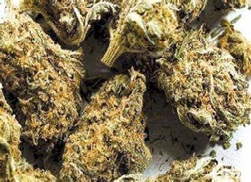
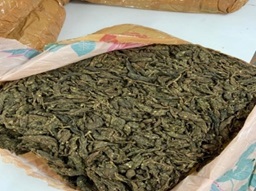
It is a drug prepared by compressing and processing parts of the cannabis plant, typically focusing on flowering buds of the Cannabis plant and also called as Charas or Hash. It is also processed to liquid form which is known as Hashish Oil or Hash oil.

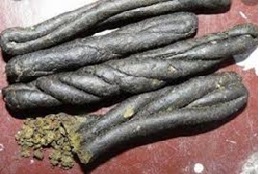
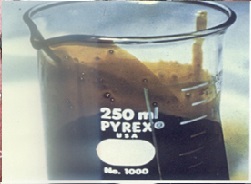
It is a highly addictive non-synthetic narcotic drug whichis the latex of the pod of the Opium Poppy (Papaver somniferum) plant and is dark brown in colour in solid form. It is smoked, intravenously injected, or taken in pill form. Opium is also abused in combination with other drugs.Opium use leads to physical and psychological dependence, and can lead to overdose which causes slow breathing, seizures, dizziness, weakness, loss of consciousness, coma, and possible death.
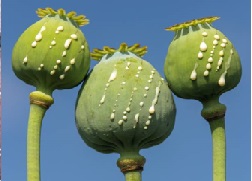
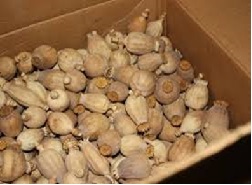

Morphine is a non-synthetic narcotic with a high potential for abuse and is derived from opium. It is mainly used as an analgesic (pain medication). There are numerous methods used to administer morphine: oral; sublingual; via inhalation; injection into a muscle, injection under the skin etc. It acts directly on the central nervous system (CNS) and with repeated administration physical and psychological dependence may develop and further lead to numerous health issues.
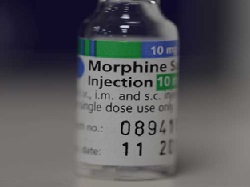
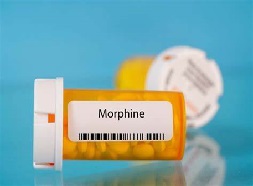

Heroin is chemically known as diacetylmorphine and diamorphine, which is synthesized from Opium and is highly addictive and used only for recreational purpose.Since heroin is commonly injected, users are also at risk for HIV and hepatitis, which can be transmitted through shared needles.
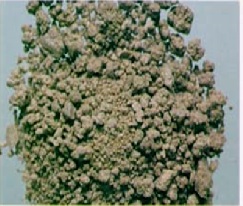
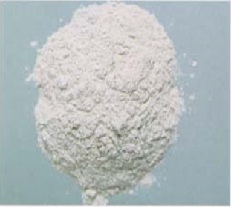
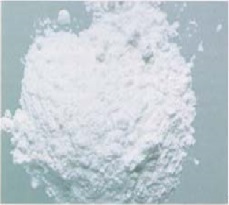
is also a drug derived from Opium and is used in treating cough mainly, which also has harmful addictive effects on human body if taken without prescription, codeine is one of the essential ingredient of cough syrups which needs to be obtained with a medical prescription. Therefore, this has resulted trafficking ofcodeine based cough syrup forthe purpose of abuse.
It is a drug extracted from the coca plant which is found only in Central and South American countries.It is a strong addictive stimulant drug which is abused for short livedaddictive euphoric feeling, which has harmful effects on the human body. It is commonly called as Coke, Charlie, C etc.

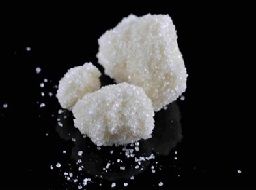
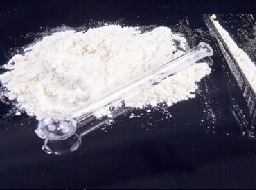
It is a stimulant drug, which has severe adverse effects on human body. It is usually in form of white powder. Amphetamines are generally taken orally or injected.Chronic abuse produces a psychosis that resembles schizophrenia: paranoia, hallucinations, violent and erratic behavior. Overdose can also cause convulsions, and possible death.
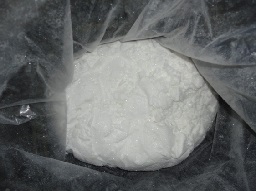
Usually a white powder that is smoked, snorted, or injected, this powerful stimulant is highly addictive. Methamphetamine (often known simply as "meth") can speed up the heart rate, as well as cause hyperthermia, an extremely high body temperature, cause anxiety, insomnia, and even psychotic symptoms, like hallucinations. Severe dental problems can also occur; the drug is acidic and can wear down teeth over time. Users often grind their teeth as well, further damaging them.As with heroin users, people who inject methamphetamine are at risk for HIV and hepatitis.
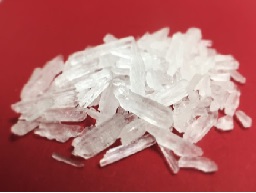
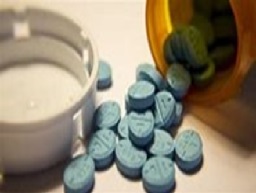
MDMA belongs to a family of synthetic compounds related to the amphetamines. It is also called as Ecstasy, MD, M etc. It acts as a stimulant and hallucinogen, producing an energizing effect, distortions in time and perception, and enhanced enjoyment of tactile experiences and adolescents and young adults get addicted to these drugs for the temporary effects.It is usually in form of colourful pill and in different shapes and is widely abused as a party drug. This also comes in form of crystal. MDMA is usually abused by swallowing and in some cases dissolved and injected.
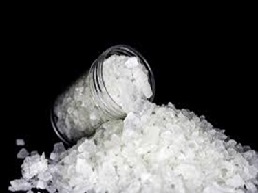
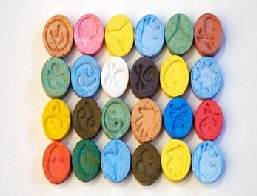

Lysergic acid diethylamide (LSD) is a potent hallucinogen that has a high potential for abuse and currently has no accepted medical use in treatment. They are also called as Acid, Blotter paper, kagaz etc.LSD is available in saturated absorbent paper (e.g., blotter paper, divided into small, decorated squares, with each square representing one dose), tablets or “micro dots,” saturated sugar cubes, or in a liquid form. LSD is abused orally.Serious psychological harm can occur after administration, including fear, depression, anxiety, and paranoia, and can be long-lasting.
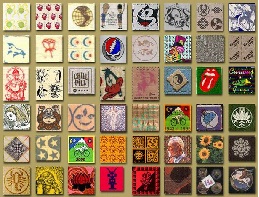
Mephedrone, also known as 4-methylmethcathinone, 4-MMC, and 4-methylephedrone, is a synthetic stimulant drug of the amphetamine and cathinone classes. Slang names include M-CAT, meow meow, MD. It is chemically similar to the cathinone compounds found in the Khat plant of eastern Africa, which is also banned under NDPS Act. It comes in the form of tablets or crystals, which users can swallow, snort or inject, producing effects similar to those of MDMA, amphetamines and cocaine.In addition to its stimulant effects, mephedrone produces side effects, of which bruxism is the most common.
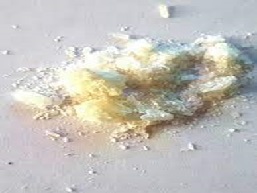
Ketamine is a dissociative anesthetic that has some hallucinogenic effects. It is also called as K or Special K. It distorts the perception of sight and sound and makes the user feel disconnected and not in control. Ketamine can induce a state of immobility,amnesia and is abused for the dissociative sensations and hallucinogenic effects. It causes unwanted side effects such as agitation, depression, cognitive difficulties, unconsciousness, and has also been used to facilitate sexual assault. Overdose can cause unconsciousness and dangerously slowed breathing. Ketamine is injected, liquid mixed with liquids, powder that is snorted mixed in drinks, or smoked.
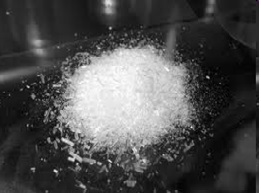

Tramadol is used primarily to treat mild to severe pain, both acute and chronic. The most common adverse effects of tramadol abuse include nausea, dizziness, dry mouth, indigestion, abdominal pain, vertigo, vomiting, constipation, drowsiness, and headache. Long-term use of high doses of tramadol causes physical dependence and withdrawal syndrome. Psychiatric symptoms may include hallucinations, paranoia, extreme anxiety, panic attacks, and confusion. Overdose cases can vary but typically includes neurological, cardiovascular, and gastrointestinal manifestations.[39] The predominant neurological symptoms are seizures and altered levels of consciousness, ranging from somnolence to coma.
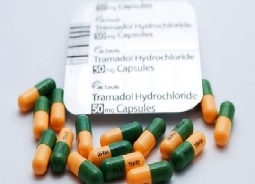

Psilocybin comes from certain types of psilocybe mushrooms. Psilocybin is metabolized in the body to the active drug psilocin, also present in many of the same mushrooms. They are also known as Magic mushrooms, Mushrooms, Shrooms. Psilocybin mushrooms are ingested orally. They may also be brewed as a tea or added to other foods to mask their bitter flavor. The physical effects include: Nausea, vomiting, muscle weakness, and lack of coordination. The psychological consequences of psilocybin use include hallucinations and an inability to discern fantasy from reality. Panic reactions and a psychotic-like episode also may occur. Abuse of psilocybin mushrooms could also lead to poisoning if one of the many varieties of poisonous mushrooms is incorrectly identified as a psilocybin-containing mushroom.
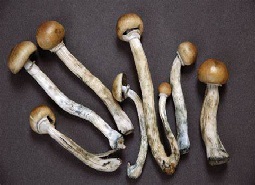
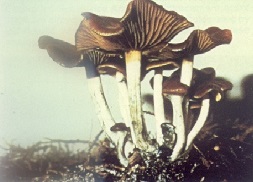
Barbiturates are depressant drugs used to help sleep, relieve anxiety, muscle spasms, and prevent seizures.Benzodiazepines are depressants that produce sedation and hypnosis, relieve anxiety and muscle spasms, and reduce seizures. These are usually the medical prescription drugs which are to be taken only under the prescription of a medical practitioner. However, these prescription drugs abused for the depressant effects, which eventually results in serious health issues.

Stimulant drugs, such as cocaine and amphetamines have a greater impact on the release of excitatory neurotransmitters and thus produce a higher level of wakefulness and a more radically altered mood. That is why these stimulant drugs are sometimes known as "speed". Chronic, high-dose use is frequently associated with agitation, hostility, panic, aggression, and suicidal or homicidal tendencies. Paranoia, sometimes accompanied by both auditory and visual hallucinations, may also occur. Tolerance, in which more and more drug is needed to produce the usual effects, can develop rapidly, and psychological dependence occurs. In fact, the strongest psychological dependence observed occurs with the more potent stimulants. Abrupt cessation is commonly followed by depression, anxiety, drug craving, and extreme fatigue. Taking large dose at one time or taking large doses over an extended period of time cause such physical side effects as dizziness, tremors, headache, flushed skin, chest pain with palpitations, excessive sweating, vomiting and abdominal cramps. In overdose, unless there is medical intervention, high fever, convulsions, and cardiovascular collapse may precede death. Because accidental death is partially due to the effects of stimulants on the body’s cardiovascular and temperature regulating systems, physical exertion increases the hazards of stimulant use
Depressant drugs, like heroin, work in much the same way on mood and personality but activate inhibitory chemical messengers. They slow down the activity of the central nervous system, which reduces a person’s alertness and slows down breathing and heart rate. However, the repeated use of such drugs over an extended period of time can cause the body to adjust the amount of naturally occurring inhibitory chemicals it produces. This leads to the phenomena of tolerance. More and more of the drug have to be taken in order to get the desired effect. In building tolerance to the effects of a drug, the user may be taking the first steps on the road to physical drug dependence. The side effects include drowsiness, Confusion, Headache, Lack of self-control, dizziness, slurred speech and blurred vision, breathing problems, impaired judgment, insomnia, nausea and vomiting, memory loss and other mental issues
Hallucinogenic drugs, like LSD, N-Bome, Psilocybin ('magic' mushrooms) etc.,, affect those areas of the brain which control sensory perception and thought patterns. They do this by altering the way in which the messages are received and interpreted. The change in mood or personality brought about by hallucinogenic drugs is more likely to be influenced by the set and setting of the drug use than the purely pharmacological action of the drugs themselves within the central nervous system. They are also known as ‘Psychedelics’. The effects of hallucinogens can last several hours which includes feelings of euphoria associated with blurred vision, hallucinations and distorted perception, including visual, auditory, body, time and space; disorganized thoughts, confusion and difficulty concentrating, thinking or maintaining attention; anxiety, agitation, paranoia and feelings of panic; dizziness; blurred vision; loss of coordination; increased breathing rate; increased heart rate and blood pressure; irregular heartbeat, palpitations; nausea and vomiting; increased body temperature and sweating, may alternate with chills and shivering; numbness. The hallucinogen also causes ‘Bad trips’ and may experience unpleasant and/or intense hallucinations, paranoia, anxiety, panic or fear. Feelings of panic, paranoia and fear can lead to risky behaviour that can cause injury, such as running across a busy street. Some people may experience a drug induced psychosis after using hallucinogens. This can occur after a single dose or long-term use. The psychosis is usually characterized by hallucinations, delusions and bizarre behaviour. High doses of hallucinogens can increase the negative immediate effects and can cause a person to overdose. This means that a person has taken more hallucinogen than their body can cope with. Not knowing the strength or purity of the hallucinogen increases the risk of overdose. Deaths generally occur due to suicide, accidents and dangerous behaviour, or due to the person inadvertently eating poisonous plant material. An overdose of PCP or Ketamine can result in depressed breathing, coma, convulsions, seizures and death. As the effects of the hallucinogen begin to wear off a person may experience a range of effects. These effects can last for a number of days after use and may include depression, anxiety, panic attacks and psychosis.
ड्रग्स विभिन्न रुपोँ मेँ मिलती हैँ और अनेकों प्रकार से ली जा सकती हैँ। कुछ वैध होती हैँ और कुछ नहीँ होतीं। नशीले पदार्थोँ का दुरूपयोग अनेक प्रकार की स्वास्थ्य संबंधी समस्याएँ पैदा कर सकता है और अति गंभीर मामलोँ मेँ मृत्यु भी हो सकती है। स्वस्थ होने में अक्सर ड्रग्स के दुरुपयोग का इलाज करवाने से सहायता मिलती है।
यह नशीले पदार्थ शारीरिक नाड़ी तंत्र को तेज कर देते हैं और शक्ति का एहसास करवाते हैँ। इन्हें अपर भी कहा जाता है क्योंकि यह आपको पूरी तरह जगाने की क्षमता रखते हैं। उत्तेजकों का प्रभाव अवसादकों से उल्टा होता है। जब उत्तेजकों का प्रभाव क्षीण होता है तो प्रयोगकर्ता को विशेषत: कमजोरी और शक्ति क्षीण होने का एहसास होता है। प्रयोगकर्ता पर ऐसे नशीले पदार्थोँ का लगातार प्रयोग अत्याधिक नकारात्मक प्रभाव डालता है। इन नशीले पदार्थोँ का चरम नकारात्मक अतिरिक्त प्रभाव और इनके जीवन पर होने वाले असर को रोकने के क्रम मेँ ड्रग्स उपचार केंद्र की अक्सर सिफारिश की जाती है ।
इन्हेलेंट को सूंघा या मुंह से खींचा जाता है और ये प्रयोगकर्ता को तुरंत परिणाम देते हैं। बदकिस्मती से यह तुरंत परिणाम अचानक होने वाली मानसिक क्षति मेँ भी परिवर्तित होते हैँ। जब इन्हेलेंट को लिया जाता है, तो शरीर को आक्सीजन की कमी हो जाती है जिससे हृदय गति तेज हो जाती है। हमेँ लीवर, फेफड़े और किडनी संबंधी समस्याएँ, सूंघने की शक्ति पर प्रभाव, चलने मेँ मुश्किल और अनिश्चितता जैसी समस्याएं होती हैं।
इन नशीले पदार्थों के परिणामों में उत्साह, अनिश्चितता और याददाश्त संबंधी समस्याएं होना ।
उत्कंठा, बढ़ी हुई दिल की धड़कन और साथ-साथ ही लड़खड़ाना और प्रतिक्रिया का धीमा समय होना।
अवसादक शरीर के केंद्रीय नाड़ी तंत्र के चालन को धीमा कर देते हैँ। इन ड्रग्स को “डाउनर” भी कहा जाता है क्योंकि यह शरीर को धीमा कर देते हैँ और तनावरहित होने का एहसास करवाते हैँ। अवसादक तनाव और गुस्से से निजाद दिलाने वाले नुस्खे के रुप मेँ उपलब्ध हैं, हालांकि उनींदापन अक्सर ही एक अतिरिक्त प्रभाव होता है। इन ड्रग्स से होने वाला 'तनावमुक्ति' का एहसास शरीर को अनुभव होने वाला एक स्वस्थकर एहसास नहीं होता। इस ड्रग के दुरूपयोग को रोकने के लिए ड्रग उपचार का सुझाव दिया जाता है।
INTERNATIONAL DAY AGAINST DRUG ABUSE AND ILLICIT TRAFFICKING - JUNE 26
Activities done by NCB
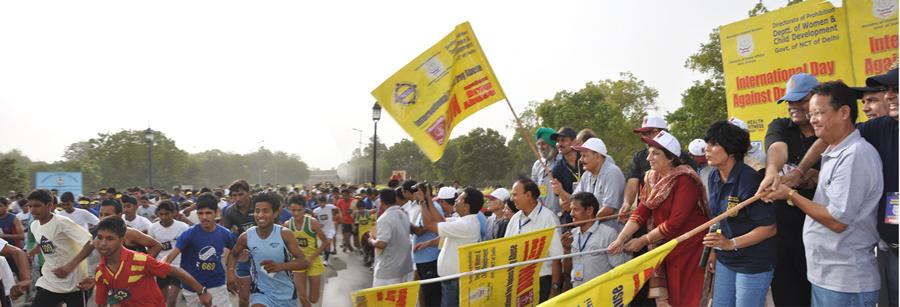
The “International Day against Drug Abuse and Illicit Trafficking” is a United Nations initiative to raise awareness among the masses against drug abuse and illegal drug trade. It has been held annually since 1988 on 26 June, a date chosen to commemorate Lin Zexu's dismantling of the opium trade in Humen, Guangdong, just before the First Opium War in China. The observance was instituted by the General Assembly to observe 26 June as an expression of its determination to strengthen action and cooperation to achieve the goal of an international society free of drug abuse.
The message given by UNODC (United Nations Office on Drug and Crime) for 26th June 2016 is “Listening to children and youth is the first step to help them grow healthy and safe”. "Listen first" is an initiative to increase support for prevention of drug use that is based on science and is thus an effective investment in the well-being of children and youth, their families and their commmunities.
The Narcotics Control Bureau being the nodal agency for drug law enforcement in India observe the ‘International Day against Drug abuse and Illicit Trafficking on 26th June, with many programs/activities to raise awareness among the public about the harmful effects of drug abuse in society. NCB through its field formations around the country takes this opportunity to organize various types of events every year in conjunction with local communities and state governments to celebrate the World Drug Day with full vigor.
NCB is also the nodal authority for coordination of actions of various Ministries, departments and States in respect of matters relating to Drugs.
Apart from the above NCB has also organizing following programme all over the country through its field units to spread drug awareness among the masses:-
NCB in its endeavor to spread awareness against drug abuse has decided to directly address the students their parents, teachers and counselors with the objective to explain the deleterious effects of drugs, the responsibility of parents and teachers and what each one of us can do.
Youth in our country is especially vulnerable to this menace. Drug abuse along with the abuse of alcohol coupled with smoking of tobacco products is taking a heavy toll on the health of the youth. It entails not only health costs but also economic and social costs. To summarize, the spread of drug abuse among the youth has starting hurting the foundation of our society.
Narcotics Control Bureau, under the Ministry of Home Affairs, Government of India is the Central Nodal Authority on all drug related issues in India. Its mandate includes enforcement of the laws against trafficking of drugs as also coordination among various Ministries issues relating to drug abuse and its prevention. In its function relating to drug abuse, Narcotics Control Bureau organizes awareness programmes so as to contain the spreading menace of drug abuse engulfing all sections of the society.Organising awareness programs in Schools and Colleges
Mission SPANDAN (Spiritual Partnership Against Narcotic Drug Abuse - Nationwide) is a pioneering initiative launched to address the growing challenge of drug abuse and psychotropic substances in India. Envisioned during the 7th Apex Level NCORD meeting under the leadership of the Hon’ble Union Home Minister, the mission seeks to integrate spirituality, awareness, and community engagement to combat drug abuse on a national scale.
This initiative brings together the influence and reach of renowned spiritual and social organizations to create widespread awareness, foster a spiritual dimension in the fight against drugs, and engage communities across all sections of society. The goal is to significantly reduce demand and build a healthier, drug-free India.
On 02.12.2024, under the guidance of the Shri Anurag Garg, Director General, Narcotics Control Bureau (NCB), a Memorandum of Understanding (MoU) signing ceremony was held with five leading spiritual organizations:
This partnership marks a significant milestone in India’s efforts toward demand reduction. By collaborating with these organizations, NCB aims to amplify awareness campaigns and ensure broader outreach, making anti-drug initiatives more impactful.
Mission SPANDAN reflects a collective commitment to eradicate drug abuse and promote a healthier, positive society. Together, we stand united to make India drug-free.
Under Mission SPANDAN, the Narcotics Control Bureau (NCB) plays a pivotal role in providing technical assistance, educational resources, and coordination with state and local authorities to drive anti-drug campaigns. NCB ensures the seamless implementation of initiatives by collaborating with spiritual organizations and amplifying outreach through digital platforms, media, and community engagement. The bureau also monitors progress, gathers feedback for continuous improvement, and advocates for legal reforms such as fast-track courts for drug-related cases. Additionally, NCB promotes public participation in initiatives like the E-pledge and strengthens anti-drug policies through legislative and operational support.
Spiritual organizations, on the other hand, leverage their influence and networks to spread the message “Say No to Drugs” across communities. They actively organize rallies, workshops, and youth-focused programs in educational institutions to create drug-free campuses and inspire healthier lifestyles. By integrating anti-drug messages into their spiritual teachings and promoting practices like yoga and meditation, they foster resilience and mental well-being. These organizations also mobilize grassroots leadership and collaborate with NCB in executing impactful campaigns, ensuring that Mission SPANDAN’s message reaches the most vulnerable sections of society. Together, they form a unified front against drug abuse, committed to creating a healthier and drug-free India.
Under the visionary guidance of Hon’ble Union Home Minister Shri Amit Shah and the leadership of DG NCB Shri Anurag Garg, IPS, the Narcotics Control Bureau (NCB) formalized a historic collaboration with five esteemed spiritual organizations—The Art of Living, Prajapita Brahma Kumaris Ishwariya Vishwa Vidyalaya, ISKCON, Sant Nirankari Charitable Foundation, and Shri Ram Chandra Mission—on 02 December 2024 at NCB Headquarters, New Delhi. This partnership, forged under Mission SPANDAN, seeks to combat the growing menace of drug abuse by integrating the influence of spirituality with nationwide awareness and community engagement. Envisioned during the 7th Apex Level NCORD meeting, the initiative aims to empower youth, foster holistic lifestyles, and build a resilient, drug-free India, marking a transformative milestone in the nation’s fight against substance abuse.









As per the National Policy on Narcotic Drugs and Psychotropic Substances, Narcotic Drugs and Psychotropic Substances have several medical and scientific uses. However, they can be and are also abused and trafficked. India's approach towards Narcotic Drugs and Psychotropic Substances is enshrined in Article 47 of the Constitution of India which mandates that the State shall endeavour to bring about prohibition of the consumption except for medicinal purposes of intoxicating drinks and of drugs which are injurious to health’. The same principle of preventing use of drugs except for medicinal use was also adopted in the three international conventions on drug related matters, viz., Single Convention on Narcotic Drugs, 1961, Convention on Psychotropic Substances, 1971 and the UN Convention Against Illicit Traffic in Narcotic Drugs and Psychotropic Substances, 1988. India has signed and ratified these three conventions. India’s commitment to prevention of drug abuse and trafficking predates the coming into force of the three conventions.
The Narcotic Drugs and Psychotropic Substances (NDPS) Act, 1985 was framed taking into account India’s obligations under the three UN drug Conventions as well as Article 47 of the Constitution mentioned above. This Act prohibits, except for medical or scientific purposes, the manufacture, production, trade, use, etc. of narcotic drugs and psychotropic substances.
The Governments’ policy has thus been to promote their use for medical and scientific purposes while preventing their diversion from licit sources, and prohibiting illicit traffic and abuse. Unlike the earlier Opium Acts and the Dangerous Drugs Act which it replaced, the NDPS Act has given the power of enforcement to various central and state law enforcement agencies, thus spreading the net of law enforcement far and wide. The NDPS Act It is also possible for the central and State Governments to notify any new class of officers of any department to enforce.
The NDPS Act divides the powers and responsibility of regulation of licit activities. Section 9 of the Act has listed various activities which the Central Government can, by rules, regulate while section 10 lists various activities which the State Governments can, by rules, regulate. Thus, we have NDPS Rules of the Central Government and the State NDPS Rules framed by each State Government under the same Act. These are enforced by the Central or concerned State Government.
The NDPS Act has created statutory authorities such as the Narcotics Commissioner (Section 5), the Competent Authority (Section 68D) and the Administrator (Section 68G). The organization headed by the Narcotics commissioner is known as the Central Bureau of Narcotics (CBN). Another authority called the Narcotics Control Bureau was created through a notification under Section 4 of the Act. Each of these authorities has specified functions.
Government business is divided in the Central Government as per the Allocation of Business Rules. As per these Rules, the NDPS Act is administered by the Ministry of Finance, Department of Revenue. However, matters pertaining to Drug Demand Reduction are handled by the Ministry of Social Justice & Empowerment (MSJE). MSJE supports various NGOs involved in Drug Demand Reduction. Ministry of Health, Government of India, which is responsible for all health issues, runs several drug de-addiction centres in the Government hospitals across the country. The Narcotics Control Bureau, under the Ministry of Home Affairs (MHA), coordinates actions by various functionaries (Central and State) under the NDPS Act.
The State Governments also have their own Health Departments and Social Welfare Departments each of which has its own set of activities relating to Drug Demand Reduction.
The National Policy on NDPS prepared in consultation with the concerned Ministries, organisations and State Governments aims to: (a) Spell out the policy of India towards narcotic drugs and psychotropic substances; (b) Serve as a guide to various Ministries and organisations in the Government of India and to the State Governments as well as International Organisations, NGOs, etc.; and (c) Re-assert India’s commitment to combat the drug menace in a holistic manner.
Chemicals frequently used in the manufacture of illicit narcotic drugs and psychotropic substances are referred to as precursors. These chemicals have a large number of legitimate uses and a small fraction of the total production is sufficient to meet the requirements of the illicit drug industry.The UN Convention Against Illicit Traffic in Narcotic Drugs and Psychotropic Substances, 1988 identified the precursors chemicals which need to be controlled. The table below consists of the precursor chemicals including the amendments made by the Commission on Narcotic Drugs in force as of 23 November 1992
| Table I | Table II |
|---|---|
| N -acetylanthranilic acid | Acetic anhydride |
| Ephedrine | Acetone |
| Ergometrine | Anthranilic acid |
| Ergotamine | Ethyl ether |
| Isosafrole | Hydrochloric acid |
| Lysergic acid | Methyl ethyl ketone |
| 3,4-methylenedioxyphenyl-2-propanone | Phenylacetic acid |
| 1-phenyl-2-propanone | Piperidine |
| Piperonal | Potassium permanganate |
| Pseudoephedrine | Sulphuric acid |
| Safrole | Toluene |
| The salts of the substances listed in this Table whenever the existence of such salts is possible. | The salts of the substances listed in this Table whenever the existence of such salts is possible (the salts of hydrochloric acid and sulphuric acid are specifically excluded) |
In India, precursors are controlled under three different Acts and by three different agencies as follows
This order issued under Section 9A of the NDPS Act,1985 requires manufacturers, distributors, sellers, importers, exporters and consumers of specified precursor chemicals termed as controlled substances to maintain records and file quarterly returns with the Narcotics Control Bureau. The precursor chemicals under control are specified under Schedule A, B and C of the RCS Order and are mentioned as under.
Controlled substances under domestic control
Controlled substances under export and import control.
Owing to the changing drug scenario in the world, especially in manufacturing of narcotic drugs and psychotropic substances, the said RCS Order of 1993 was amended in the year 2013, through which it was mandated to all the entities dealing with these scheduled precursor chemicals (of Schedule-A) for commercial purpose to obtain a Unique Registration number, without which no activity related to the precursor chemicals can be carried out.
The precursor chemical control in India involves various agencies including law enforcement, Customs and Regulatory agencies because of robust chemical and Pharma industry and vastness of the country. India has so far notified 27 precursors chemicals as controlled substances.
NCB has implemented an online portal called the ‘Pre-Register’, where the Unique Registration number (URN) issued to the entities are monitored through which manufacturing, distribution, sale, purchase, storage and possession of the precursor chemicals is tracked.
In 2019, legislation under the RCS Order was passed where all the online/social media/advertising/distribution platforms of the controlled substances were also brought under the ambit of law, in order keep a check on the B2B companies, where transactions happen for purchase and sale of precursor chemicals on their online platform.
The export-import policy framed under the Foreign Trade (Development and Regulation) Act, 1992 imposes restrictions on the import and export of goods. Export of seven precursors is subject to a “No Objection Certificate” and import of three precursors is restricted.Export of Acetic anhydride, Ephedrine, Pseudoephedrine, Methyl ethyl ketone, 1-Phenyl-2-Propanone, 3,4 methylenedioxyphenyl-2-propanone and Potassium permanganate require a “No Objection Certificate” from the Narcotics Commissioner. The import of acetic anhydride, ergometrine, ergotamine and piperonal also require a “No Objection Certificate” from the Narcotics Commissioner.
The goods specified under this section are subject to intensive checks in the specified areas by the Customs officers. Acetic anhydride has been notified as a specified substance under this section within an area of 100 km. along the Indo – Myanmar border and 50 km. along the Indo-Pak border by the Government of India. Broadly, the special measures under this section require all persons who own, possess or transport acetic anhydride to maintain records and notify the Customs officers of the details of quantities held and transported.The Central Government, in exercise of powers conferred by Section 9A of NDPS Act 1985, issued an order called The Narcotic Drugs and Psychotropic Substances (Regulation of Controlled Substances Order 1993) which came into effect on 15th April 1993. This order stipulates various procedures with regards to specified substances declared to be controlled
These are:
The states should set up an Anti Narcotics Task Force under an IG level officer with duties and responsibilities duly demarcated.
The state should have formalized an Action Plan to address narcotics related issues. The Action Plan should include, inter-alia, identification of regions which are sensitive to drugs trafficking, requiring focused attention and strategies for action in these regions. The Action Plan should address both demand control and supply control strategies.Assistance to states can be provided for acquiring equipment for surveillance, laboratories and offices. The scheme does not provide for assistance to meet recurring expenditure. Assistance will be provided only to cells/units which are exclusively engaged in drug law enforcement. The assistance received shall not be diverted for other purpose. Assistance will also be provided for special projects falling within the mandate of NCB. The assistance would be in the form of a grant in aid to states with no matching assistance required.The grant-in-aid may be given on an annual basis, subject to submission of utilization certificate and audit certificate in respect of utilization of grants received earlier.
स्वापक औषधि एवं मन:प्रभावी पदार्थ अधिनियम 1985 (एनडीपीएस अधिनियम) ने भारत में औषध कानून प्रवर्तन के लिए एक सांविधिक ढांचा निर्दिष्ट किया है। यह अधिनियम उस समय के मुख्य अधिनियमों जैसे अफीम अधिनियम 1857, अफीम अधिनियम 1878 तथा खतरनाक औषध अधिनियम 1930 को समेकित करता है। एनडीपीएस अधिनियम विभिन्न अंतर्राष्ट्रीय अभिसमयों के अधीन भारत के दायित्वों के कार्यान्वयन हेतु बनाए गए प्रावधानों को भी समाविष्ट करता है। अधिनियम में औषध के अवैध व्यापार से अर्जित संपत्ति की जब्ती तथा रसायनों व स्वापक औषध एवं मन:प्रभावी पदार्थों के विनिर्माण में प्रयोग होने वाले पदार्थों पर नियंत्रण हेतु 1989 में कुछ महत्वपूर्ण संशोधन किए गए थे। इन पदार्थों से संबंधित सांविधिक प्रावधानों को कार्यान्वित करने हेतु भारत सरकार ने 1993 में ऐसे किसी पदार्थ जिसे सरकार द्वारा इस अधिनियम के अंतर्गत नियंत्रित पदार्थ घोषित किया जाए, के विनिर्माण, वितरण, आयात, निर्यात, परिवहन इत्यादि के नियंत्रण, विनिमयन, अनुवीक्षण हेतु एनडीपीएस (नियंत्रित पदार्थों का विनियमन) नाम से एक आदेश जारी किया। इसके फलस्वरुप भारत में सांविधिक शासन औषध-व्यापार, औषध संबंधी संपत्ति के साथ स्वापक औषध एवं मन:प्रभावी पदार्थों के विनिर्माण में प्रयोग किए जा सकने वाले पदार्थों की व्याख्या करता है। 2001 में एनडीपीएस अधिनियम में मुख्यतः श्रेणीबद्ध सजा आरंभ करने हेतु कुछ संशोधन समाविष्ट किए गए।
राज्यों को एक महानिरीक्षक स्तर के अधिकारी के अंतर्गत स्वापक औषध रोधी कार्य बल स्थापित करना चाहिए और इनके कर्त्तव्यों तथा उत्तरदायित्वों को विधिवत् रुप से निर्धारित करना चाहिए।
राज्यों द्वारा स्वापक औषधों से संबंधित मामलों से निपटने के लिए एक कार्य योजना तैयार की हुई होनी चाहिए। कार्य योजना में अन्य बातों के साथ-साथ ऐसे प्रदेशों की पहचान करना जो ड्रग्स के अवैध व्यापार के शिकार हो सकते हैं और जिन पर इन प्रदेशों में ध्यान केंद्रित करने तथा कार्रवाई की रणनीतियाँ तैयार करने की आवश्यकता है, को शामिल होना चाहिए। कार्य-योजना में माँग नियंत्रण और आपूर्ति नियंत्रण की रणनीतियों को शामिल किया जाए। राज्यों को सहायता निगरानी, प्रयोगशालाओं एवं कार्यालयों के उपकरणों की प्राप्ति के लिए ही दी जा सकती है। इस योजना में बारम्बार होने वाले खर्चों की पूर्ति के लिए सहायता देने की व्यवस्था नहीं है। सहायता केवल उन्हीं कक्षों/एककों को प्रदान की जाएगी जो विशेषकर ड्रग कानून प्रवर्तन के कार्यों में लगे होंगे। प्राप्त सहायता को किसी अन्य उद्देश्य के लिए प्रयोग में नहीं लाया जाएगा। स्वापक नियंत्रण ब्यूरो के शासनादेश के अंतर्गत आने वाली परियोजनाओं के लिए भी सहायता प्रदान की जाएगी। यह सहायता, राज्यों को सहायता-अनुदान के प्ररुप में होगी जिसमें किसी समान प्रकार की सहायता अपेक्षित नहीं है। सहायता-अनुदान वार्षिक आधार पर दिया जाएगा जो कि उपयोग प्रमाण-पत्र तथा पहले प्राप्त सहायता का प्रयोग करने संबंधी लेखा-परीक्षा प्रमाण-पत्र प्रस्तुत करने की शर्त पर ही दिया जाएगा।
1. केन्द्रीय उत्पाद शुल्क, स्वापक, सीमा शुल्क, राजस्व आसूचना विभागों अथवा अर्ध-सैनिक बलों या सशस्त्र बलों समेत केन्द्रीय सरकार के किसी अन्य विभाग का कोई ऐसा अधिकारी (जो किसी चपरासी, सिपाही अथवा कांस्टेबल की श्रेणी से उच्च अधिकारी हो), जिसे केन्द्रीय सरकार द्वारा, साधारण अथवा विशेष आदेश द्वारा, इस संबंध में सशक्त किया जाता है, अथवा राज्य सरकार के राजस्व, औषधि नियन्त्रण, उत्पाद-शुल्क, पुलिस अथवा किसी अन्य विभाग का कोई ऐसा अधिकारी (जो किसी चपरासी, सिपाही अथवा कांस्टेबल की श्रेणी से उच्च अधिकारी हो), जिसे राज्य सरकार के साधारण अथवा विशेष आदेश द्वारा इस संबंध में सशक्त किया जाता है, यदि उसे व्यक्तिगत जानकारी अथवा किसी व्यक्ति द्वारा दी गई और लिखित में ली गई सूचना से विश्वास करने का कारण हो, कि कोई स्वापक औषधि अथवा मनःप्रभावी पदार्थ और नियन्त्रित पदार्थ जिसके संबंध में और इस अधिनियम के अन्तर्गत दंडित करने योग्य अपराध कारित किया गया है अथवा कोई दस्तावेज अथवा अन्य वस्तु जो उस अपराध को कारित करने के साक्ष्य को प्रस्तुत कर सकती है अथवा कोई अवैध रुप से अर्जित सम्पत्ति अथवा कोई दस्तावेज अथवा अन्य वस्तु जो किसी अवैध रुप से अर्जित सम्पत्ति को धारण करने के साक्ष्य को प्रस्तुत कर सकती है, जो इस अधिनियम के अध्याय 5-क के अन्तर्गत अभिग्रहण अथवा स्थिरीकरण अथवा समपहरण के लिए दायी है, किसी भवन, प्रवहण अथवा परिवेष्टित स्थान में रखा अथवा छुपाया है, सूर्योदय अथवा सूर्यास्त के मध्य -
2. जब कोई अधिकारी उप-धारा (1) के अन्तर्गत किसी सूचना को लिखित में लिखता है अथवा उसके परन्तुक के अन्तर्गत अपने विश्वास के लिए आधारों को अभिलेखित करता है, वह 72 घण्टों के भीतर उसकी एक प्रति अपने अव्यवहित उच्च अधिकारी को भेजेगा।
NCB is the Central Authority for exercising powers and functions of the Central Government under NDPS Act.
NCB is the nodal agency for matters pertaining to drug law enforcement in India.
NCB coordinates actions taken by various agencies of Central and State Governments related to drug law enforcement in the country and matters pertaining to drug abuse.
| Issue Area | What is being done (specific issue of coordination) |
|---|---|
| Regional Coordination Meetings – organized annually by NCB in 4 regions of India. |
In-depth discussion on drug trafficking related issues Deliberations to formulate strategies to neutralize drug trafficking in coordination with other LEAs. |
| Coordination with States
(a) Institutional mechanisms at State for financial assistance for improving their enforcement capabilities. (b) Organizing training modules for other drug LEAs and providing funds and resource persons. (c) Distribution of DD Kits (d) Reward proposal |
State Level Coordination Committee under Chief Secretary.
Anti-Narcotics Task Force headed by an IG level officer. 5 year Action Plan to address narcotics related issues. Being done Need for improved and more reliable DD kits Clearing all pending reward proposals |
|
Visits of States by NCB officers |
DG NCB, DDG’s regularly visit States and meet CSs/ DGPs and other officers to interact on drug related matters. ZDs of NCB regularly visit States to monitor utilization of Assistance provided to States and for other matters. |
|
National Meetings |
Narcotics Coordination Committees of Secretaries headed by Secretary Revenue. DG, NCB is Convener Meeting with DCGI, NC and CCF for submission of returns to INCB. Meeting with Nodal Officers of 10 illicit poppy growing States. Multi Agency Centre (MAC) meeting Central Economic Intelligence Bureau (CEIB) meeting |
| Coordination meeting held by other agencies |
State Multi Agency Coordination (SMAC) meeting Regional Economic Intelligence Council (REIC) meeting Lead Intelligence Agency (LIA) meeting |
The illicit drug trade is a global crime that knows no borders. It involves complex international Networks, trafficking routes, and illegal money flows. For India, this challenge is especially serious because of its location between the Golden Crescent and the Golden Triangle—two of the world’s largest drug-producing regions. This makes India both a transit route and a growing target market for narcotics.
To address this, international coordination is not merely an option but a critical and indispensable national security mandate.
India is fully committed to global cooperation and is a signatory to all three UN Drug Control Conventions (1961, 1971, and 1988), demonstrating unwavering commitment to the global legal standard.
India actively participates in global and regional organizations to shape its counter-narcotics policy and leverage collective strength to solidify its defence through:
To support this cooperation, India has built a strong legal and operational framework through:
These agreements form the foundation of India’s international efforts, enabling real-time information sharing, cooperation in investigations, and mutual legal assistance to effectively combat drug trafficking and related crimes.
स्वापक नियंत्रण ब्यूरो एन डी पी एस अधिनियम के अन्तर्गत केन्द्र सरकार की शक्तियों और कृत्यों का निर्वहन करने के लिए केन्द्रीय प्राधिकरण है।
स्वापक नियंत्रण ब्यूरो भारत में स्वापक कानून प्रवर्तन से संबंधित मामलों के लिये नोडल एजेंसी है।
स्वापक नियंत्रण ब्यूरो देश में ड्रग कारन प्रवर्तन से संबंधित केन्द्र और राज्य सरकारों की विभिन्न एजेंसियों द्वारा की गई कार्रवाइयों और ड्रग्स के दुरुपयोग से संबंधित मामलों का समन्वय करता है।
| विषय | क्या किया जा रहा है(समन्वय का विशिष्ट विषय) |
|---|---|
| क्षेत्रीय समन्वय बैठकें - भारत के चार क्षेत्रों में स्वापक नियंत्रण ब्यूरो द्वारा वार्षिक रुप से आयोजित। |
नशीले पदार्थों के अवैध व्यापार से संबंधित विषयों पर गहराई से चर्चा। नशीले पदार्थों के अवैध व्यापार को विफल करने के लिए अन्य कानून प्रवर्तन एजेंसियों के साथ विचार विमर्श कर कार्यनीति बनाना। |
| राज्यों के साथ समन्वय
राज्यों का उनकी प्रवर्तन क्षमताओं को सुधारने के लिए वित्तीय सहायता हेतु संस्थागत कार्यतंत्र। नशीले पदार्थों की अन्य कानून प्रवर्तन एजेंसियों के लिए प्रशिक्षण मॉड्यूल बनाना और धन एवं स्रोत व्यक्तियों को उपलब्ध करवाना। डी डी किट्स उपलब्ध करवाना । पुरस्कार प्रस्ताव। |
मुख्य सचिव के अधीन राज्य स्तरीय समन्वय समिति
महानिरीक्षक स्तर के अधिकारी की अध्यक्षता में स्वापक पदार्थ रोधी कार्यबल। स्वापक पदार्थों संबंधी विषयों पर कार्रवाई करने के लिए 5 वर्षीय कार्य योजना। किया जा रहा है। उन्नत एवं अधिक विश्वसनीय डी डी किट्स उपलब्ध करवाए जाने की आवश्यकता । सभी लंबित पुरस्कार प्रस्तावों को निपटाना। |
|
स्वापक नियंत्रण ब्यूरो के अधिकारियों द्वारा राज्यों का दौरा। |
महानिदेशक स्वापक नियंत्रण ब्यूरो, उप महानिदेशक नियमित रूप से राज्यों का दौरा करते हैं एवं ड्रग्स से संबन्धित मामलों पर परस्पर कार्रवाई करने के लिए सीएस/डीजीपी एवं अन्य अधिकारियों से मिलते हैं। स्वापक नियंत्रण ब्यूरो के क्षेत्रीय निदेशक राज्यों को प्रदान की गई सहायता के उपयोग को मॉनीटर करने के लिए उनके लगातार दौरे करते हैं। |
|
राष्ट्रीय बैठकें |
सचिव राजस्व की अध्यक्षता में सचिवों की स्वापक पदार्थ समन्वय समितियां। महानिदेशक, स्वापक नियंत्रण ब्यूरो संयोजक हैं। आई एन सी बी को विवरणियाँ प्रस्तुत करने के लिए डीसीजीआइ, एन सी और सी सी एफ के साथ बैठकें। अफीम की अवैध खेती करने वाले 10 राज्यों के नोडल अधिकारियों के साथ बैठक। बहु एजेन्सी केन्द्र ( मल्टी एजेन्सी सेंटर, एम ए सी) बैठक। केन्द्रीय आर्थिक आसूचना ब्यूरो ( सी ई आई बी) बैठक । |
|
अन्य एजेन्सियों द्वारा आयोजित समन्वय बैठकें। |
राज्य बहु एजेन्सी समन्वय ( एस एम ए सी) बैठक। क्षेत्रीय आर्थिक आसूचना परिषद् (आर ई आई सी ) बैठक। लीड आसूचना एजेन्सी ( एल आई ए ) बैठक। |
For Zonal Director, Deputy Directors and Assistant Directors
The Narcotics Control Bureau (NCB) and Central Board of Secondary Education (CBSE), today signed a landmark Memorandum of Understanding (MoU) at the CBSE Headquarters, Dwarka, New Delhi, to strengthen cooperation in creating drug-free school environment and raising awareness against substance abuse.
The MoU was signed by Shri Anurag Garg, IPS, Director General, NCB and Shri Rahul Singh, IAS, Chairperson, CBSE in the presence of more than 500 school principals and counsellors associated with CBSE affiliated schools of NCR.
In his address, Shri Anurag Garg, Director General, NCB, highlighted the crucial role of educational institutions in combating the menace of drugs and reaffirmed NCB’s support in conducting awareness campaigns, workshops, and counselling programs. He also informed about the MANAS helpline – 1933, where any citizen can provide information regarding drug trafficking as well as seek assistance for counselling or rehabilitation, with complete assurance that their identity will be kept confidential throughout the process. DG, NCB also discussed the increasing use of vapes, which can serve as a gateway to nicotine and narcotics addiction. He further informed that the manufacture, production, import, export, transport, and advertisement of vapes are prohibited and punishable under law, and requested that related information be shared with law enforcement authoritiesas
| S.No | CENTRAL FORENSIC SCIENCE LABORATORIES | EMAIL ADDRESS | LOCATION |
|---|---|---|---|
| 1 | Central Forensic Science Laboratories (CFSL), New Delhi | dcfsl[at]cbi[dot]gov[dot]in | |
| 2 | Central Forensic Science Laboratories (CFSL), Hyderabad | director[dot]cfsl[hypen]hyd[at]gov[dot]in | |
| 3 | Central Forensic Science Laboratories (CFSL), Chandigarh | cfsl[hypen]chd[at]nic[dot]in | |
| 4 | Central Forensic Science Laboratories (CFSL), Guwahati | coord[dot]cfsl[hypen]ghy[at]gov[dot]in | |
| 5 | Central Forensic Science Laboratories (CFSL), Bhopal | cfslbho[hypen]mp[at]gov[dot]in | |
| 6 | Central Forensic Science Laboratories (CFSL), Pune | cfslpune[hypen]dfss[at]gov[dot]in | |
| 7 | Central Forensic Science Laboratories (CFSL), Kolkata | dircfsl[hypen]kol[at]gov[dot]in |
Director Telangana Forensic Science Laboratory, Police Department, Govt of Andhra Pradesh. Red Hills, Hyderabad -500004
The Director/Head State Forensic Science Laboratory Kahilipara Assam, Guwahati – 781019
The Director/Head State Forensic Science Laboratory Arunachal Pradesh Banderdewa – 791123
Director State Forensic Science Laboratory J L N Marg, P.O. Shastri Nagar Bihar, Patna – 800023
Director State Forensic Science Laboratory Police Line Campus, Tikrapara, Raipur Chhattisgarh – 492002
Director General Directorate of Forensic Science Behind Police Bhawan, Sector 18 A, Gandhi Nagar, Gujrat - 382010
Director State Forensic Science Laboratory Madhuban, Karnal Haryana – 132037
Director State Forensic Science Laboratory Junga, Himachal Pradesh – 173216
Director Forensic Science Laboratory J&K, Bikram Chowk, Jammu Tawi - 180001
Director State Forensic Science Laboratory Near Birsa Munda Jail, Hotwar Jharkhand, Ranchi – 835217
Director, State Forensic Science Laboratory Sarjapur Road, Madiwala, Bengaluru, Karnataka - 560068
Director Forensic Science Laboratory 5, Civil Lines, Sagar Madhya Pradesh – 470001
Director State Forensic Science Laboratory Hans Bhugra Marg, Santacruz (E), Vidya Nagari Mumbai, Maharashtra – 400098
Director State Forensic Science Laboratory Pangei, Manipur – 795114
Director State Forensic Science Laboratory Lumshyiap, Shillong Meghalaya – 793001
Director Forensic Science Laboratory Dimapur, Nagaland – 797112
Director Forensic Science Laboratory Mualpui, Mizoram Aizawal – 796001
Director State Forensic Science Laboratory Rasulgarh, Bhubneshwar Oddisa – 751010
Director Forensic Science Laboratory Near Telephone Exchange, Phase –IV, SAS Nagar, Mohali, Punjab
Director State Forensic Science Laboratory Bank Hous Compund, Villayambalam Thiruvananthapuram, Kerala – 695010
Director State Forensic Science Laboratory Jaipur, Nehru Nagar, RPA Road Rajasthan – 302016
Director Forensic Science Department “Forensic House” 30-A, Kamarajar Salai Mylapore, Chennai Tamil Nadu – 600004
Director State Forensic Science Laboratory Narsingarh, P.O. Bimangarh Tripura, Agartala – 799015
Director Forensic Science Laboratory P.O. Mahanama, Lucknow Uttar Pradesh – 226006
Director State Forensic Science Laboratory Near New Basant Vihar Police Stn., Police Housing Colony, Dehradun, Uttarakhand
Director State Forensic Science Laboratory No. 37/1/2, Belgachia Road, Belgachia, Kolkata – 700037
Director Forensic Science Laboratory Port Blair, Andaman and Nicobar Islands – 744104
Director, Regional Forensic Science Laboratory, Ranipool, Sikkim, Gangtok
Director, Forensic Science Laboratory, Verna, Goa Near Verna Police Station, Verna, Goa - 403722
Director/OSD Forensic Science Laboratory, Kirumampakkam Police Station Campus, Puducherry - 607403
Director Forensic Science Laboratory, NCT of Delhi, Madhuban Chowk Rohini, Delhi - 110085
Director Forensic Science Laboratory, Andhra Pradesh, Tech Towers 4-5th Floor, Mangalagiri - 522503
Ms. Monika Ashish Batra, IRS: 1997
Chief Vigilance Officer,
Complaints can be addressed to CVO at:
Email: cvo[hypen]ncb[at]gov[dot]in
and Deputy Director (Vigilance) at:
Email: ddvig[hypen]ncb[at]gov[dot]in
The Vigilance Section of the Narcotics Control Bureau is headed by a Chief Vigilance Officer (CVO), who is a Deputy Director General of the Department, supported by Deputy Director (Vigilance), Superintendent (Vigilance), Inspectors/Assistant (Vigilance) and other staff. Apart from handling vigilance-related cases of the Department, its subordinate offices, and autonomous bodies, the Vigilance Unit also deals with complaints received from the CVC, CBI, MHA, and other sources. It plays an active role in ensuring the prompt disposal of these complaints. The vigilance unit also handles disciplinary proceedings.
The Central Vigilance Commission’s website (https://cvc.gov.in) can also be accessed for information on making complaints, including under the Public Interest Disclosure and Protection of Informers (PIDPI).
Vigilance Awareness Week - 2024
(2005 का अधिनियम संख्यांक 22, दिनांक 21.06.2005)
(सा.का.नि. 347, दिनांक 8.10.2005 द्वारा यथासंशोधित)
( Act No 22 of 2005, dt. 21-6-2005)
( As amended vide GSR 347, dt. 8-10-2005)
An Act to provide for setting out the practical regime of right to information for citizens to secure access to information under the control of public authorities, in order to promote transparency and accountability in the working of every public authority, the constitution of Central Information Commission and State Information Commissions and for matter connected therewith or incidental thereto.
Section -24 of RTI Act, 2005:
Sec. 24 : Act not to apply to certain organizations.-
(1) Nothing contained in this Act shall apply to the intelligence and security organizations specified in the Second Schedule, being organization established by the Central Government or any information furnished by such organizations to that Government:
(2) The central Government may, by notification in the Official Gazette, amend the Schedule by including therein any other intelligence or security organization established by that Government or omitting there from any organization already specified therein and on the publication of such notification, such organization shall be deemed to be included in or, as the case may be, omitted from the Schedule.
(3) Every notification issued under sub-section (2) shall be laid before each Hose of Parliament.
(4) Nothing contained in this Act shall apply to such intelligence and security organization being organization established by the State Government, as that Government may, from time to time, by notification in the Official Gazette, specify:
(5) Every notification issued under sub-section (4) shall be laid before the State Legislature.
NCB is exempted from the purview of RTI Act, to the extent as provided under Section 24 and second schedule of RTI Act 2005, unless the information sought pertains to the allegations of corruption and human rights violations.
List of CPIOs and ACPIOs is avaliable on News and Events Section of Home page
The National Policy on Narcotic Drugs and Psychotropic Substances is based on the Directive Principles, contained in Article 47 of the Indian Constitution, which direct the State to endeavour to bring about prohibition of the consumption, except for medicinal purposes, of intoxicating drugs injurious to health. The government’s policy on the subject which flows from this constitutional provision is also guided by the international conventions on the subject.
India is a signatory to the single Convention on Narcotic Drugs 1961, as amended by the 1972 Protocol,the Conventions on Psychotropic Substances, 1971 and the United Nations Convention against Illicit Traffic in Narcotic Drugs and Psychotropic Substances, 1988.
The broad legislative policy is contained in the three Central Acts,
viz. Drugs and Cosmetics Act, 1940, The Narcotic Drugs and Psychotropic Substances Act, 1985, and The
Prevention of Illicit Traffic in Narcotic Drugs and Psychotropic Substances Act, 1988. The
responsibility of drug abuse control, which is a central function, is carried out through a number of
Ministries, Departments and Organisations. These include the Ministry of Finance, Department of
Revenue which has the nodal co-ordination role as administrator of the Narcotic Drugs and Psychotropic
Substances Act, 1985 and the Prevention of Illicit Traffic in Narcotic Drugs and Psychotropic
Substances Act, 1988.
The Narcotic Drugs and Psychotropic Substances Act, 1985 which came into effect from the 14th
November, 1985 made an express provision for constituting a Central Authority for the purpose of
exercising the powers and functions of the Central Government under the Act.
In presence of this provision, the Government of India constituted the NARCOTICS CONTROL BUREAU on the
17th of March, 1986. The Bureau, subject to the supervision and control of the Central Government, is
to exercise the powers and functions of the Central Government for taking measures with respect to:
The Narcotics Control Bureau is the apex coordinating agency. It also functions as an enforcement agency through its zonal offices. Zonal offices are located at Agartala, Ahmedabad, Amritsar, Bangalore, Bhopal, Bhubaneswar, Chandigarh, Chennai, Cochin, Dehradun, Delhi, Goa, Gorakhpur, Guwahati, Hyderabad, Imphal, Indore, Itanagar, Jaipur, Jammu, Jodhpur, Kolkata, Lucknow, Mumbai, Patna, Raipur, Ranchi, Siliguri, Srinagar and Vishakhapatnam. The zonal offices collect and analyse data related to seizures of narcotic drugs and psychotropic substance, study trends, modus operandi, collect and disseminate intelligence and work in close cooperation with the Customs, State Police and other law enforcement agencies.
Ministry of Home Affairs
| NAME | DESIGNATION | EMAIL ADDRESS |
|---|---|---|
| Shri Anurag Garg | Director General | dg[hyphen]ncb[at]nic[dot]in |
| Shri Vineet Vinayak | Additional Director General | adg[hyphen]ncb[at]gov[dot]in |
| Smt Monika Ashish Batra | Dy. Director General (Personnel & Administration) | ddgc[hyphen]ncb[at]nic[dot]in | Dy. Director General (CVO) | cvo[hyphen]ncb[at]nic[dot]in |
| Shri Maneesh Kumar | Dy. Director General (Western Region) | ddgwr[hyphen]ncb[at]gov[dot]in |
| Shri. T. G. Venkatesh | Dy. Director General (Special Wing) | ddgsplwing[hyphen]ncb[at]gov[dot]in |
| Shri R. Sudhakar | Dy. Director General (North Eastern Region) | ddgner[hyphen]ncb[at]nic[dot]in |
| Dy. Director General (Southern Region) | office[hyphen]ddgsr[hyphen]ncb[at]gov[dot]in | |
| Shri Anand Prakash Tiwari | Dy. Director General (Northern Region) | ddgnr[hyphen]ncb[at]nic[dot]in |
| Shri Sambit Mishra | Dy. Director General (North Western Region) | ddgnwr[hyphen]ncb[at]gov[dot]in |
| Shri Neeraj Kumar Gupta | Dy. Director General (Operations, Enforcement & Operational Coordination) | ddge[hyphen]ncb[at]nic[dot]in |
| Shri. Vishal M. Sanap | Dy. Director General (South Western Region) | ddgsw[hyphen]ncb[at]nic[dot]in |
| Shri Hitesh Godara | Dy. Director General (Eastern Region) | ddger[hyphen]ncb[at]nic[dot]in |
| Shri Nabarun dhar | IFA, NCB | ifa[dot]cbiho[at]cbi[dot]gov[dot]in |
| Shri Nilotpal Mrinal | Additional Director (Personnel & Administration) | dda[hyphen]ncb[at]nic[dot]in |
| Dr. Shanteshwar Swami | Additional Director (Operations) | addldops[hyphen]ncb[at]gov[dot]in |
| Additional Director (Amritsar) | zdasrzu[hyphen]ncb[at]gov[dot]in | |
| Shri Shailesh Kumar Dattatray Jambotkar | Additional Director (Digital Initiatives) | dddi[hyphen]ncb[at]nic[dot]in |
| Additional Director, Kolkata Zonal Unit | zdkzu[hyphen]ncb[at]nic[dot]in | |
| Shri Kuldeep Sharma | Zonal Director Bhubaneswar | zdbbsr[hyphen]ncb[at]gov[dot]in |
| Shri Gyanendra Kumar Singh | Dy. Director (Operations) | ddi[hyphen]ncb[at]nic[dot]in |
| Dr. Anees C. | Dy. Director (International Coordination) | ddic[hyphen]ncb[at]gov[dot]in |
| Dy. Director (Capacity Building) | ddcb[hyphen]ncb[at]gov[dot]in | |
| Dy. Director (Vigilance) | ddvig[hyphen]ncb[at]gov[dot]in | |
| Shri Vikash Kumar | Dy. Director (Coord.) | ddp[hyphen]ncb[at]nic[dot]in |
| Shri Prakash Ranjan Mishra | Additional Director Guwahati Zonal Unit | zdghtzu[hyphen]ncb[at]nic[dot]in |
| Zonal Director Agartala | zdagzu[hyphen]ncb[at]gov[dot]in | |
| Zonal Director Imphal | zdimphal[hyphen]ncb[at]gov[dot]in | |
| Zonal Director Itanagar | zditzu[hyphen]ncb[at]gov[dot]in | |
| Zonal Director Siliguri | zdslg[hyphen]ncb[at]gov[dot]in | |
| Shri Patil Ketan Baliram | Additional Director, Ahmedabad Zonal Unit | zdazu[hyphen]ncb[at]nic[dot]in |
| Shri Shailendra Kr Mishra | Zonal Director Lucknow | zdvzu[hyphen]ncb[at]gov[dot]in |
| Zonal Director Gorakhpur | zdgkp[hypen]ncb[at]gov[dot]in | |
| Shri Amanjit Singh | Additional Director Chandigarh Zonal Unit | zdczu[hyphen]ncb[at]nic[dot]in |
| Zonal Director Jammu | zdjmzu[hyphen]ncb[at]nic[dot]in | |
| Zonal Director Srinagar | zdsnr[hyphen]ncb[at]gov[dot]in | |
| Shri P. Aravindhan | Additional Director, Chennai Zonal Unit | zdszu[hyphen]ncb[at]nic[dot]in |
| Zonal Director Hyderabad | zdhzu[hyphen]ncb[at]gov[dot]in | |
| Shri V G Kurup | Zonal Director Cochin | zdcnzu[hyphen]ncb[at]gov[dot]in |
| Shri Pankaj Kumar Dwivedi | Zonal Director Vishakhapatnam | zdvszu[hyphen]ncb[at]gov[dot]in |
| Shri Sachin Ghorpade | Zonal Director Bangalore | zdblzu[hyphen]ncb[at]nic[dot]in |
| Zonal Director Goa | zdgoa[hyphen]ncb[at]gov[dot]in | |
| Shri Ritesh Ranjan | Zonal Director Indore | zdindzu[at]nic[dot]in |
| Zonal Director Bhopal | zdbzu[hyphen]ncb[at]gov[dot]in | |
| Shri Ghanshyam Soni | Zonal Director Jaipur | zdjpzu[hyphen]ncb[at]gov[dot]in |
| Zonal Director Jodhpur | zdjzu[hyphen]ncb[at]nic[dot]in | |
| Shri Deepak Hilori | Zonal Director, Delhi Zonal Unit | zddzu[hyphen]ncb[at]nic[dot]in |
| Shri Devanand | Zonal Director Dehradun | ddnzu[hyphen]ncb[at]gov[dot]in |
| Shri Amit Ghawate | Additional Director, Mumbai Zonal Unit | mzu[hyphen]ncb[at]nic[dot]in |
| Shri Abhishek Anand | Zonal Director Patna | zdpzu[hyphen]ncb[at]nic[dot]in |
| Zonal Director Ranchi | zdranchi[hyphen]ncb[at]gov[dot]in | |
| Shri Ravi Shanker Joshi | Zonal Director Raipur | zdrzu[hyphen]ncb[at]gov[dot]in |

